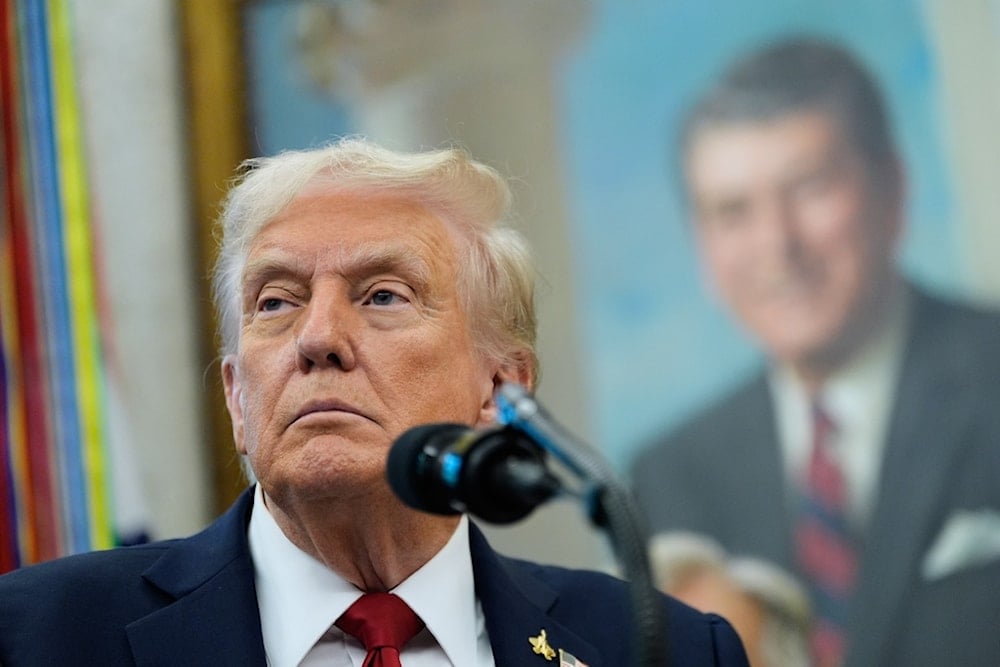Trump threatens Resistance again to respond to disarmament plan
Trump has given Hamas a Sunday deadline to accept his Gaza plan, a US-Israeli-backed proposal critics call coercive and one-sided.
-

President Donald Trump speaks in the Oval Office of the White House, Tuesday, Sept. 30, 2025, in Washington (AP Photo/Alex Brandon)
US President Donald Trump has issued an ultimatum to Hamas, giving the Palestinian resistance group until 6:00 p.m. Washington time on Sunday to accept his newly unveiled so-called Gaza "peace" proposal, warning that "all hell" will break loose if it refuses.
The threat, delivered amid ongoing US-Israeli coordination, has been widely condemned by analysts and human rights advocates as coercive diplomacy designed to entrench Washington's political agenda rather than achieve genuine peace.
White House Press Secretary Karoline Leavitt reinforced the president's tone during a Friday briefing, framing the offer as a "final opportunity" for Hamas to avoid annihilation. "Hamas has an opportunity to accept this plan and to move forward in a peaceful and prosperous manner in the region. And if they don't, the consequences, unfortunately, are going to be very tragic," she said.
A Plan Backed by 'Israel' and Built Around US Control
Unveiled last week in tandem with Israeli Prime Minister Benjamin Netanyahu, Trump's 20-point proposal presents Gaza's future as contingent upon Hamas's disarmament, the return of Israeli captives, and the establishment of a foreign-supervised administration. The plan envisions Gaza being transformed into a "demilitarized zone free of threats", overseen by a newly created international "Peace Council" chaired by Trump himself and including figures such as former British Prime Minister Tony Blair, whose legacy is tied to the Iraq and Afghanistan wars.
The proposal promises a comprehensive reconstruction program under Western and Gulf sponsorship, conditional on the complete dismantling of the Resistance's military infrastructure. It also claims to offer amnesty to Hamas members who agree to "coexistence" and renounce arms, while allowing others to leave Gaza through "safe corridors" to countries willing to receive them, a clause critics say amounts to forced expulsion.
Under the plan, Gaza's administration would shift to a non-political technocratic committee, operating under the Peace Council's supervision. A temporary international stabilization force, made up of US, Egyptian, Jordanian, and Palestinian police contingents, would be deployed to "secure borders" and manage the enclave's internal security.
An accompanying economic initiative, led by a consortium dubbed the "Miracle Cities" team, aims to attract foreign investment, establish a special economic zone, and open the enclave to global capital, but only after demilitarization.
A 'Peace Without Justice' Framework
While the Trump administration touts the plan as the "last chance for peace," critics argue it amounts to a US-Israeli blueprint for control, not reconciliation. The framework excludes Hamas and other Palestinian factions from decision-making, grants "Israel" leeway to maintain a security presence in key areas, and provides no guarantee of full sovereignty or protection from future Israeli aggression.
A group of UN experts warned that "Imposing an immediate peace at any price, regardless of or brazenly against law and justice, is a recipe for further injustice, future violence and instability." Analysts have similarly described the plan as "a form of surrender disguised as peace," noting its resemblance to past colonial models of indirect governance, where local technocrats serve under foreign oversight.
Hamas Rejects 'Surrender Disguised as Peace'
Hamas and other Palestinian Resistance factions have unanimously rejected the plan, labeling it a "document of surrender and suicide."
"This is not a peace proposal — it is a plan for submission," explained Hani al-Dali, an Al Mayadeen analyst specializing in Resistance affairs.
According to al-Dali, all factions share a unified position: the deal seeks to dismantle the Resistance, erase Palestinian sovereignty, and impose foreign rule under US-Israeli auspices. Hamas has accused Washington of bypassing diplomatic channels and issuing threats instead of engaging in dialogue, stressing that the 72-hour deadline is "meaningless" given the need for collective consultation among Palestinian groups.
Al-Dali noted that Hamas is reviewing the proposal "as part of its national duty," but its position remains firm: any framework demanding disarmament, foreign administration, or abandonment of self-defense is categorically unacceptable.
"The Resistance will not surrender its weapons or its legitimacy,"
he said, underscoring that Gaza’s defense capabilities remain essential amid ongoing Israeli violations.
A Manufactured Deadline for a Manufactured Peace
As the Sunday deadline looms, many see the ultimatum as emblematic of a US peace doctrine built on threats rather than negotiation. The Trump administration's framing of Gaza as a testing ground for "order through demilitarization" signals a broader regional vision, one that conflates resistance with terrorism while granting "Israel" impunity.
For Hamas, acceptance would mean political suicide; for Washington, refusal provides pretext for escalation. In either case, the plan appears less about ending the war than about reshaping Gaza's future under foreign control, a project many fear could entrench, rather than resolve, decades of injustice.

 5 Min Read
5 Min Read







